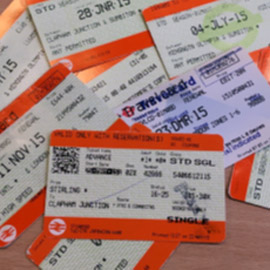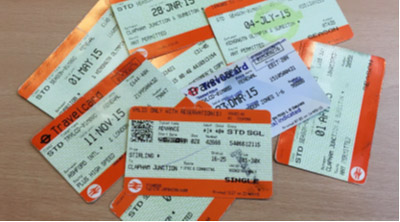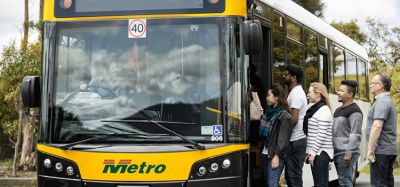Making ticketing smart
- Like
- Digg
- Del
- Tumblr
- VKontakte
- Buffer
- Love This
- Odnoklassniki
- Meneame
- Blogger
- Amazon
- Yahoo Mail
- Gmail
- AOL
- Newsvine
- HackerNews
- Evernote
- MySpace
- Mail.ru
- Viadeo
- Line
- Comments
- Yummly
- SMS
- Viber
- Telegram
- Subscribe
- Skype
- Facebook Messenger
- Kakao
- LiveJournal
- Yammer
- Edgar
- Fintel
- Mix
- Instapaper
- Copy Link
Posted: 31 March 2016 | Graham Ellis | 1 comment
In his latest blog for Intelligent Transport, Graham Ellis looks at the progress and future development of smart ticketing using data and calls on operators to provide a simple and easy ticketing system that covers all modes of transport…


In his latest blog for Intelligent Transport, Graham Ellis looks at the progress and future development of smart ticketing using data and calls on operators to provide a simple and easy ticketing system that covers all modes of transport…


This month I thought that I would have a look at ticketing. I have recently booked two foreign trips; one to Belgium and the other to Spain; where I have been able to use my smartphone to store my tickets, as well as the wine I’ve ordered on my way back from Antwerp, without the need for any paper trail. This makes it simple for me I just have to make sure I have enough charge in the phone to access my data and off I go.
My crossing on the shuttle through the channel tunnel is booked online and I have a reference number in case the entry gate at the terminal does not work , however I have never had this happen before as they have automatic number plate readers that recognises my car registration and through I go on to the shuttle. My wine invoice is also electronic having been e-mailed to me, all I have to do is turn up at the warehouse, show my invoice on the phone screen and pay for the wine. My ticket on EasyJet is fully smartphone compatible, I turn up at security wave my phone over the scanner and my boarding card is read, as it is at the boarding gate, no need for a printer or any paper to fly from the UK to Spain. My Spanish train ticket is also on my smartphone and not only does it give me my trip from Barcelona to Benicarlo but it also gives me a “free” transfer ticket from the airport to the city centre.
“I’ve just booked my ticket to get from my house to Gatwick airport and lo and behold I’ve got to go to a machine to collect an orange paper ticket”
Contrast all of the above to here in the UK , I’ve just booked my ticket to get from my house to Gatwick airport and lo and behold I’ve got to go to a machine to collect an orange paper ticket, this is amazing as Virgin trains are now providing m-tickets to their passengers. According to the train companies and the trainline everyone is working hard to offer flexible mobile tickets to all passengers. However according to the office of road and rail there are 2,533 stations in the UK and in total only 230 stations are available to facilitate m-tickets, which is less than 10% of all UK railway stations, at this rate it will be the 22nd century before this simple technology is introduced for the travelling public.
There are 2,533 stations in the UK and in total only 230 stations are available to facilitate m-tickets
Recently, Intelligent Transport hosted a Real Time Passenger Information conference in London. One of the presenters at that conference was Louise Davies – Customer Experience Lead, SEFT (South East Flexible ticketing) at the Department of Transport. In her presentation it was clear that whilst paper tickets could give some information such as when, where and how much, that was about the limit of the information available, compare that to electronic ticketing which can give you so much more information such as who, why, what time, how many passengers and how many journeys etc.
In addition it gives the customer the flexibility to sit at home and to choose what ticket is best suited to their needs and to search on line for the best deal instead of going to a machine at the station to see that the best deals are not available on the screens, you have to ask station staff, if the station ticket office is manned. With smart ticketing all sorts of data can be used to improve the passenger experience, sorry that is marketing speak, when what I mean is what is the best deal for me when I want to travel, without the hassle of having to spend ages sorting out which ticket, at what time on what day is best for me.
“With smart ticketing all sorts of data can be used to improve the passenger experience”
There are of course alternatives to using smartphones such as smartcards like oyster in London, The Key on Go-Ahead bus and train franchises and area schemes such as the Solent Go card but, if I am travelling across the region I probably have to carry a number of the cards in my wallet to ensure that I’ve got the correct bit of plastic to travel to ensure I do not get fined for travelling without the correct ticket, how much simpler of I just carry my mobile phone and show it to whoever wants to see that I have proper authority to travel without hunting out the right bit of paper or plastic.
There is however another aspect to this electronic approach, the customer can engage with the transport provider to secure up-to-date information about their forthcoming or actual travel. I have just purchased a new satellite navigation system for my car, this has live traffic updates and in-built advice about diversions to reduce any delays that may be ahead. Compare that with my trip by train once I’m on the train the only information I am likely to get is via the train crew and they are reliant on the train control centre to update them on any problems ahead. David Sidebottom from Passenger focus spoke at the real time event and his organisation has identified that passengers become frustrated and feel they are being held hostage when poor information impacts on their travel.
David told his audience that data help me avoid the problem by:
- Alerting passengers that there is a problem
- Allowing them to work around the problem
- Lets them make choices best for them
- Puts them in control – literally, but also psychologically
- Forewarns – even if you still have to go, you go with expectations already managed of the problem
- Normally only a small proportion of passengers know about disruption in advance (17% in most recent Passenger Focus research)
- Why?
- Products poor?
- Data poor?
- Built round passengers, or built round what systems make it easy to do?
Let me give you an example, my wife and I were travelling to Gatwick from Southampton to catch a plane to Spain, there had been a serious signal problem somewhere towards London and the trains were being held at stations south of Gatwick. We arrive at this station on our train and are told that there is no onward train crew as they are stuck on a Southbound service. Those of us for Gatwick were advised that a train arriving on a far platform would be departing first, so I drag our suitcase up and over the tracks to wait for this inbound train, we stand there for 10 minutes only to be told that this train was also delayed and that we should get back on the train we had got off, so we all dragged our cases back across the station and up and down stairs in time to get back on our original train, which was now standing room only. Not the train crews fault, they were trying to help but had we had electronic communications from the company we would have been aware of the problems and we may have been able to stay on our original train and still get to the airport on time.
“Had we had electronic communications from the company we would have been aware of the problems”
This is not being driven just by Passenger focus, Silke Elvery from Transport for London also looked at passenger information and TfL’s strategy for informing customers where it was found that customers became less comfortable when their journey was disrupted for whatever reason and the use of mobile phones allows up to the minute information to be passed to customers and allows them to then decide the best way to continue their journey. With their ticket loaded onto the phone it also makes it easier for passengers to change between transport providers when an interruption to travel occurs, quite often announcements are made that tell travellers that their tickets are being accepted by other providers to overcome travel disruption and having an electronic tickets allows a smooth transition between modes and operators as well as allowing these extra passengers to be recorded for cross-charging between operators at a later date.
Overall it would be better for all travellers if their tickets could be loaded onto a single machine to provide easy access to all ticketing and to allow data capture to be quick and easy with no inconvenience to the traveller. We now have to wait to see how quickly we travel operators can provide this simple and easy ticketing system to their existing offerings and then we will see if it makes any difference to retention of public transport users. We also need to ensure that cross ticketing is also available to travellers so that they can purchase an electronic ticket to perhaps travel by bus, ferry and train on the same ticket, at the moment this is not always possible due to train franchise restrictions but it is to be hoped that the new franchises currently being tendered will include the ability to cross-ticket.
Related topics
Ticketing & Payments









Multi-modal multi-operator nationwide smart ticketing via a smartphone – that is exactly what MultiPass have been building over the past two years, having raised over £8.5m from its investors.